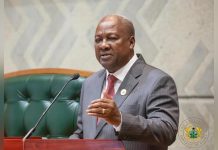Africa-Press – Ghana. Accra, Dec 10, GNA-The renaissance of Pan-Africanism guided discussions at the Ghana- South African Business Forum as both countries seek to liberate themselves from the economic burden of exporting natural resources outside the continent, which get returned as value-added products at a higher cost.
The phenomenon is said to have deprived the continent of an opportunity to build the capacity of its labour force and its industry, hence unable to compete favourably on the global scene.
The business community in Ghana, therefore, met their South African counterpart in Accra this week to promote a stronger trade partnership as the continent seeks to promote intra-trade through the Africa Continental Free Trade Area (ACFTA).
The presidents of both countries, Nana Addo Dankwa Akufo-Addo of Ghana and Cyril Ramaphosa of South Africa, at the forum among other things, agreed on the need for stronger intra-trade, the need for trade activities to be run by the private sector and the building of domestic capabilities to manufacture COVID-19 vaccines.
After a thematic focus group session, both countries agreed on the need for investment in the semi-finished or tertiary stage of the cocoa value chain through existing local initiatives such as the “One District One Factory” initiative.
It was highlighted that the AfCFTA Secretariat needed to set up a functional unit to manage Youth and women-owned businesses while leaders were encouraged to establish policies at the continental level to build capacity, improve access to finance, protect interest and foster partnership among youth and women-owned businesses.
The groups among other things recognised the need to standardise curriculum development for engineering education, collaboration to improve the mobility of certified engineers and the need to strengthen cooperation among engineers within the continent.
It was also captured that both countries needed to collaborate to streamline and standardise regulatory systems for contract execution in both countries, recognise the human dimension when working across different cultures and strengthen local content on procurement for infrastructure.
Both countries further agreed to the need for a database of African engineers in the diaspora, as well as the depoliticisation of projects so that the African private sector can invest in economic activities.
The Secretary-General of AfCFTA, Wamkele Mene, expressed the interest of the AfcFTA Secretariat in the bilateral and multilateral relations on the continent, saying, such agreement was critical to breaking down barriers to intra-Africa trade and investments.
He noted that Ghana and South Africa were well-positioned through bilateral trade to take advantage of the presence of automotive giants in Ghana to become drivers of the automotive sector in Africa.
He reiterated the need to accelerate industrial development by designing appropriate Rule of Origin or local content requirements, which would help develop value-added products made in Africa, creating millions of jobs.
He urged the private sector to own the AfCFTA initiative by fully participating in the implementation process, especially at a time when a private sector engagement strategy had been developed to help identify initiatives to facilitate the development of regional value chain on the continent through the inclusion of women and the youth.
“This strategy focuses on four initial priority sectors of value chains that include Agro-processing, automotive sector, pharmaceuticals, transport and logistics based on the potential for import substitution and existing production capabilities,” he said.
Mr Alan Kyerematen, the Minister of Trade and Industry was optimistic that the effective implementation of the free trade agreement would further strengthen economic ties between both countries, especially when the value in trade since 2016 had increased from USD708 million to USD2 billion in 2019.
The economic scourge of the COVID-19 pandemic that had disrupted global supply chains, he said, did highlight the need for integration among African economies to reduce dependency on companies operating outside the continent.
“It is not by chance that Ghana is the host of AfCFTA and South Africa has produced the first Secretary-General for us,” he said, to lay emphasis on the strategic role of both countries in fostering intra-trade.
His South African counterpart, Mr Ebrahim Patel who is the Minister of Trade, Industry and Competition, said with Ghana being a growing supplier of oil to South Africa, it had managed to export USD1.68billion of goods to South Africa with South Africa exporting about USD366.3 million to Ghana last year.
“Currently it supplies 10 per cent of our oil import, which drives the South African economy” he added. He urged African countries to work on re-establishing intra continental trade routes that were active prior to the colonisation of the continent.
The Chief Executive Officer (GIPC) of the Ghana Investment Promotion Centre, Mr Yofi Grant, urged African countries to consider the geographic advantage Ghana offered due to its proximity to major markets and destinations, when planting industries.
“It is imperative that we change the narration, and we change the structure of our economies to industrialise and in doing so, I think Ghana finds the partnership with South Africa very instructive and inspirational,” he said.
The CEO of the National Empowerment Fund of South Africa, Ms. Philisiwe Buthelezi, urged both countries to consider homegrown policies that would guarantee local industries access to jobs in both countries.
She highlighted the need for both countries to diversify inter-trade, urging Ghana to shift away from exporting primary products while South African should consider other areas of trade aside exporting semi to manufactured products.
For More News And Analysis About Ghana Follow Africa-Press







